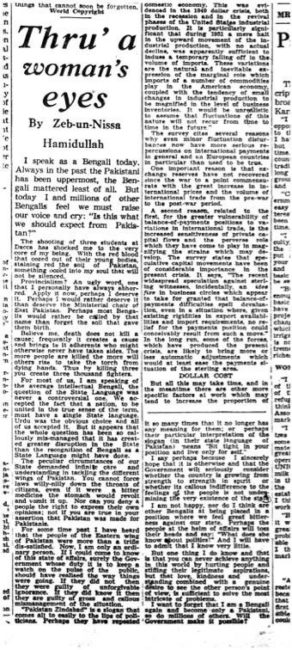Zeb-un-Nissa Hamidullah
I speak as a Bengali today. Always in the past, the Pakistani has been uppermost, the Bengali mattered least of all. But today I and millions of other Bengalis feel we must raise our voice and cry: ” Is this what we should expect from Pakistan?”
The shooting of three students at Dacca has shocked me to the very core of my being. With the red blood that oozed out of their young bodies, staining red the soil of Pakistan, something oozed into my soul that will not be silenced.
Provincialism? An ugly word one that I personally have always abhorred. Apply it now, perhaps I deserve it. Perhaps I would rather deserve it than deserve the Ministerial chair of East Pakistan. Perhaps most Bengalis would rather be called by that name than forget the soil that gave them birth.
Believe me, death does not kill a cause; frequently it creates a cause and brings to it adherents who might otherwise never have taken sides. The more people are killed the more will others (sic) rise to take the torch from dying hands. Thus by killing three you create three thousand fighters.
For most of us, I am speaking of the average intellectual Bengali, the question of the State Language was never a controversial one. We accepted the fact that a nation, to be united in the true sense of the term, must have a single State language. Urdu was the obvious choice and all of us accepted it. But it appears that the whole question has been so callously mismanaged that it has created greater disruption in the State than the recognition of Bengali as a State Language might have done.

The peculiar circumstances of our State demanded infinite care and understanding in tackling the different wings of Pakistan. You cannot force laws willy-nilly down the throats of citizens, even if it were a bitter medicine the stomach would revolt and vomit it up. Nor can you deny a people the right to express their own opinions: not if you are true in your assertion that Pakistan was made for Pakistanis.
For some time past I have heard that the people of the Eastern wing of Pakistan were more than a trifle dissatisfied. Now, I am only an ordinary person. If I could come to know of this state of affairs, surely the Government whose duty it is to keep a watch on the pulse of the public should have realised the way things were going. If they did not then they were guilty of unforgivable ignorance. If they did know it then they are guilty of gross and callous mismanagement of the situation.
“Pakistan Zindabad” is a slogan that comes all too easily to the lips of politicians. Perhaps they have repeated it so many times that it no longer has any meaning for them; or perhaps their particular interpretation of the slogan (in their state language of Pakistan) means “sit tight in your position and live only for self.”
I say perhaps because I sincerely hope that it is otherwise and that the Government will seriously consider whether the country is growing from strength to strength in spirit or whether its callous indifference to the feelings of the people is not undermining the very existence of the state.
I am not happy, nor do I think are other Bengalis at being placed in a position where we feel great bitterness against our state. Perhaps the people at the helm of affairs will toss their heads and say,” What does she know about politics?” And I will have to admit that I know very little. But one thing I do know and that is that you can never achieve anything in this world by hurting people and stifling their legitimate aspirations, but that love, kindness and understanding combined with a genuine desire to see the other person’s point of view, is sufficient to solve the most intricate of problems. I want to forget that I am a Bengali again and become only a Pakistani, so do millions of others. Will the government make it possible?
Zeb-un-Nissa Hamidullah (1921-2000) was one of the first South Asian women journalists. She was the editor and publisher of one of the most popular Pakistani pictorials, Mirror.
The article was published in the Dawn (Pakistan) on Feburary 25, 1952.
